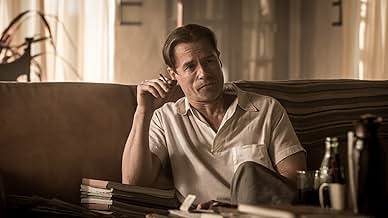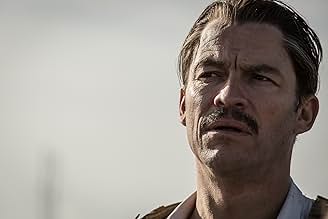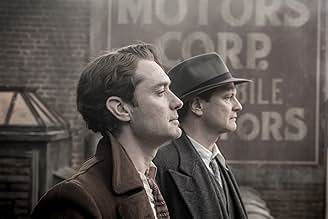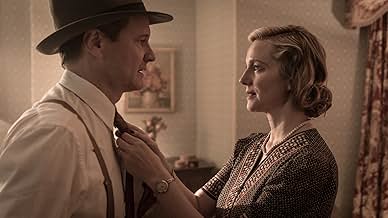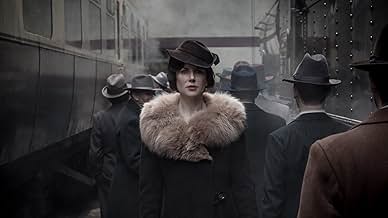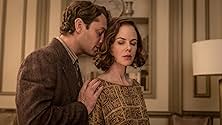AVALIAÇÃO DA IMDb
6,5/10
22 mil
SUA AVALIAÇÃO
A época de Max Perkins como editor do livro na Scribner, onde supervisionou trabalhos de Thomas Wolfe, Ernest Hemingway, F. Scott Fitzgerald e outros.A época de Max Perkins como editor do livro na Scribner, onde supervisionou trabalhos de Thomas Wolfe, Ernest Hemingway, F. Scott Fitzgerald e outros.A época de Max Perkins como editor do livro na Scribner, onde supervisionou trabalhos de Thomas Wolfe, Ernest Hemingway, F. Scott Fitzgerald e outros.
- Prêmios
- 1 vitória e 6 indicações no total
Angela Sant'Albano
- Bertha Perkins
- (as Angela Ashton)
Ray Strasser King
- James, Mailroom Clerk
- (as Ray Strasser-King)
- Direção
- Roteiristas
- Elenco e equipe completos
- Produção, bilheteria e muito mais no IMDbPro
Avaliações em destaque
7vsks
Director Michael Grandage's movie Genius about the relationship between legendary Scribners editor Maxwell Perkins and flamboyant author Thomas Wolfe has received generally tepid reviews. I for one am delighted an editor is finally receiving some screen time! Wolfe was an author whose moods, enthusiasms, and output were not easily corralled, even by someone with Perkins's experience. After all, he'd brought works to the public from other outsized personalities and authors with personal difficulties—notably Ernest Hemingway and F. Scott Fitzgerald.
It's easy to imagine the slammed door that would greet an author today who showed up with a 5,000-page manuscript as Wolfe did with his second book, Of Time and the River. The challenging task of turning this into a readable manuscript epitomizes the editor's dilemma, as Perkins puts it, "Are we really making books better, or just making them different?" Getting 5,000 pages down to a still-hefty 900 made it different, all right. And better, at least in the sense of more likely to be read, too.
Colin Firth, as Perkins, keeps his hat on during almost the entirety of the movie, symbolic perhaps of how his character tried to keep a lid on his difficult author. Jude Law as Wolfe is by turns outrageous, contrite, drunk, and sentimental. Pretty much like the novels, actually. His performance is consistent and always interesting. He shows Wolfe as a man with a lot of words bottled up inside him who couldn't always control the way they poured out.
It's odd to see an all-British and Australian cast playing so many titans of American literary history, including Perkins and Wolfe, Guy Pearce as Fitzgerald, and Dominic West as Hemingway. (The Hemingway scene necessitated an ending credit for "marlin fabricator.") The women in the lives of the protagonists are Laura Linney as Mrs. Perkins, perfect as always, and Nicole Kidman, who believably portrays the obsessed Mrs. Bernstein. She's left her husband to cultivate and promote the much younger Wolfe and is not lacking a flair for the dramatic herself.
The movie is based on the National Book Award-winning Perkins biography by A. Scott Berg, transformed into a screenplay by John Logan. New Yorker critic Richard Brody dings the script for its departures from the detailed and more richly peopled original, including the book's fuller explanation for the rupture between Wolfe and Scribners. While I disagree with some critiques of the filmed story, Brody says a lawsuit and Wolfe's unsavory political views played a part, and leaving the latter out seems a mistake. A fuller exploration of the break-up could have put some meat on the bones.
Portraying in cinema an intrinsically intellectual and abstract enterprise is difficult (The Man Who Knew Infinity struggled with the same challenge.) Like me, reviewer Glenn Kenny at Roger Ebert.com apparently had not read the book, so did not have Brody's reservations. Kenny found "the exchanges between editor and author exhilarating. Logan's script . . . is invested in the craft of words like few other movies nowadays, even those ostensibly about writers." Wolfe blasted onto the American literary scene like a runaway train and left it before he could accomplish a judicious application of the brakes. Yet, he eventually realized who'd kept him on track, as his moving deathbed letter attests.
It's easy to imagine the slammed door that would greet an author today who showed up with a 5,000-page manuscript as Wolfe did with his second book, Of Time and the River. The challenging task of turning this into a readable manuscript epitomizes the editor's dilemma, as Perkins puts it, "Are we really making books better, or just making them different?" Getting 5,000 pages down to a still-hefty 900 made it different, all right. And better, at least in the sense of more likely to be read, too.
Colin Firth, as Perkins, keeps his hat on during almost the entirety of the movie, symbolic perhaps of how his character tried to keep a lid on his difficult author. Jude Law as Wolfe is by turns outrageous, contrite, drunk, and sentimental. Pretty much like the novels, actually. His performance is consistent and always interesting. He shows Wolfe as a man with a lot of words bottled up inside him who couldn't always control the way they poured out.
It's odd to see an all-British and Australian cast playing so many titans of American literary history, including Perkins and Wolfe, Guy Pearce as Fitzgerald, and Dominic West as Hemingway. (The Hemingway scene necessitated an ending credit for "marlin fabricator.") The women in the lives of the protagonists are Laura Linney as Mrs. Perkins, perfect as always, and Nicole Kidman, who believably portrays the obsessed Mrs. Bernstein. She's left her husband to cultivate and promote the much younger Wolfe and is not lacking a flair for the dramatic herself.
The movie is based on the National Book Award-winning Perkins biography by A. Scott Berg, transformed into a screenplay by John Logan. New Yorker critic Richard Brody dings the script for its departures from the detailed and more richly peopled original, including the book's fuller explanation for the rupture between Wolfe and Scribners. While I disagree with some critiques of the filmed story, Brody says a lawsuit and Wolfe's unsavory political views played a part, and leaving the latter out seems a mistake. A fuller exploration of the break-up could have put some meat on the bones.
Portraying in cinema an intrinsically intellectual and abstract enterprise is difficult (The Man Who Knew Infinity struggled with the same challenge.) Like me, reviewer Glenn Kenny at Roger Ebert.com apparently had not read the book, so did not have Brody's reservations. Kenny found "the exchanges between editor and author exhilarating. Logan's script . . . is invested in the craft of words like few other movies nowadays, even those ostensibly about writers." Wolfe blasted onto the American literary scene like a runaway train and left it before he could accomplish a judicious application of the brakes. Yet, he eventually realized who'd kept him on track, as his moving deathbed letter attests.
I find it hard to understand how this excellent film is getting negative reviews from critics. It is like a breath of fresh air for thinking movie goers. It is a thoughtful, intelligent and highly entertaining look at Maxwell Perkins, an editor who as he said wanted to bring "good books" to the public. He did, bringing us the works of Fitzgerald, Hemingway and Thomas Wolfe who is the focus of the film. It gives a historical perspective of two opposites (Perkins and Wolfe) who working together create something substantial. Perkins is a strong main character with a noble moral center, beautifully underplayed by Firth. When did we last see someone acting nobly in a film? In contrast, to the larger than life and decadent Wolfe (I had no idea Wolfe was played by Jude Law, until after the film) Law immerses himself in the character. The fact that this is a true story makes it all the more compelling. My fifteen year old daughter who is well versed in the writings of both Fitzgerald and Hemingway encouraged me to see Genius. We both walked away exhilarated; the way you feel after seeing a really good movie that transported you somewhere else. The Director, writer, actors and composer/ scorer all did a first rate job to help bring a to bring a great film to the public.
A bunch of great actors portraying a bunch of great writers (plus a publicist, though that would be an understatement for the role he played). As you can imagine the acting is superb, male and female talent have a lot to bite and chew off with their roles. The dialog is great and I was surprised this didn't do better or was promoted better (at least in Germany).
Then again it's not an easy watch, what with lots of dialog and drama. But the tension it builds (especially concerning the relationships of the characters within) is really great. Flaws are here to be exposed and the actors cherish them, playing them perfectly. It's a period piece and therefor may interest some people more than others. But if you like good drama, you could do worse
Then again it's not an easy watch, what with lots of dialog and drama. But the tension it builds (especially concerning the relationships of the characters within) is really great. Flaws are here to be exposed and the actors cherish them, playing them perfectly. It's a period piece and therefor may interest some people more than others. But if you like good drama, you could do worse
Colin Firth and Jude Law Portray editor Max Perkins and his newest client, Tomas Wolfe. Perkins is a tight wound package of seriousness, work being his life. Wolfe is a frenetic writer, eating up everything around him with voracity. The polar opposites take on Wolfe's first novel, "Look Homeward, Angel." I admit, Law's Wolfe is energizer- bunny out-of-control frenetic at times, but it's that kind of mind that gave us one of the greatest (if not the greatest) American novels of all time. Having read "Angel," I completely bought into it. The relationship between editor and writer becomes extremely close, at times casting aside the women in their lives. Laura Linney is Louise Perkins, devoted wife to Max and their 5 daughters. She is also trying to keep her own writing career alive, with little help from her work obsessed husband. Nicole Kidman is Aline Bernstein, a married woman currently shacking up with Wolfe. She was his inspiration in writing "Angel" and is over zealously jealous of Tom's relationship with Max. Like, seriously, wack-job crazy. This role was the weak link for me, didn't like her from her second appearance on screen. The movie moves through their lives, another published book, and on to Wolfe's untimely death. (I am pretty sure that isn't a spoiler.) I don't want to go in to the plot anymore, except to say that I agree with another reviewer about the scene in the jazz club. A really great way to show how minds, and the streaming of thought, can be so different between people.
The cinematography is beautiful, sepia tones bring you back to the years right before and during the depression. Extravagance and soup kitchens, back-to-back. The music bangs out with Wolfe's bombastic behavior, and mellows with Max.
This movie is a movie about writers and readers, for what editor isn't a closet writer? It's also for the same audience, with several nods to a few other greats of that period; Hemingway and F. Scott Fitzgerald, but mostly, to Wolfe. When Max is reading "Angel" through for the first time, his daughter walks in. She looks at the page and says, "Wow, that's a really long paragraph" and Max answers "It started four pages ago..." THAT is Wolfe. That book was the most difficult book I have ever read. This movie is also about, who exactly is the genius? Wolfe is, obviously. But does that make Max, who edited, made these books marketable, and made Wolfe a celebrity of his day, any less of a genius? That is left for the viewer.
The cinematography is beautiful, sepia tones bring you back to the years right before and during the depression. Extravagance and soup kitchens, back-to-back. The music bangs out with Wolfe's bombastic behavior, and mellows with Max.
This movie is a movie about writers and readers, for what editor isn't a closet writer? It's also for the same audience, with several nods to a few other greats of that period; Hemingway and F. Scott Fitzgerald, but mostly, to Wolfe. When Max is reading "Angel" through for the first time, his daughter walks in. She looks at the page and says, "Wow, that's a really long paragraph" and Max answers "It started four pages ago..." THAT is Wolfe. That book was the most difficult book I have ever read. This movie is also about, who exactly is the genius? Wolfe is, obviously. But does that make Max, who edited, made these books marketable, and made Wolfe a celebrity of his day, any less of a genius? That is left for the viewer.
"O lost, and by the wind grieved, ghost, come back again." ― Thomas Wolfe, Look Homeward, Angel
Max Perkins (Colin Firth) was the genius Scribner's magazine editor, who helped Hemingway, Fitzgerald, and Wolfe become iconic American writers. The watchable Genius, directed by Michael Grandage with a sure understanding of drama, is mostly Thomas Wolfe's (Jude Law) story. The taciturn Max provides the necessary guidance to make sure the book belongs to the writer while Max delivers "good books into the hands of readers."
Although the film is engrossingly placed in Perkin's pv, Wolfe dominates through his exuberant personality and unending energy. While Firth plays Perkins as the conservative but imaginative editor, Law is the reason to see the film, a brilliant acting turn reminiscent of his over-the-top Dom Hemingway. Law simply has never been better than as Wolfe.
The sepia look of the film is appropriate to the 1929 setting of NYC, and Nicole Kidman as his other muse, Aline Bernstein, is memorably smart and vulnerable when it comes to dealing with manic Wolfe. Although Laura Linney as Louise Perkins is lost in spotty, low energy appearances, her general good cheer carries nicely for a Perkins of whom the audience has grown fond.
Because I am always seeking a biography that will show the creative labors of artists, Genius satisfies me when Perkins and Wolfe struggle over the manuscripts. After experiencing Genius, I have seen two sterling examples.
Max Perkins (Colin Firth) was the genius Scribner's magazine editor, who helped Hemingway, Fitzgerald, and Wolfe become iconic American writers. The watchable Genius, directed by Michael Grandage with a sure understanding of drama, is mostly Thomas Wolfe's (Jude Law) story. The taciturn Max provides the necessary guidance to make sure the book belongs to the writer while Max delivers "good books into the hands of readers."
Although the film is engrossingly placed in Perkin's pv, Wolfe dominates through his exuberant personality and unending energy. While Firth plays Perkins as the conservative but imaginative editor, Law is the reason to see the film, a brilliant acting turn reminiscent of his over-the-top Dom Hemingway. Law simply has never been better than as Wolfe.
The sepia look of the film is appropriate to the 1929 setting of NYC, and Nicole Kidman as his other muse, Aline Bernstein, is memorably smart and vulnerable when it comes to dealing with manic Wolfe. Although Laura Linney as Louise Perkins is lost in spotty, low energy appearances, her general good cheer carries nicely for a Perkins of whom the audience has grown fond.
Because I am always seeking a biography that will show the creative labors of artists, Genius satisfies me when Perkins and Wolfe struggle over the manuscripts. After experiencing Genius, I have seen two sterling examples.
Você sabia?
- CuriosidadesA. Scott Berg's biography "Max Perkins: Editor of Genius", on which the film is based, won the National Book Award in 1978.
- Erros de gravaçãoMaxwell Perkins tells Thomas Wolfe his book needs a new title that will appeal to potential purchasers, and gives the example of F. Scott Fitzgerald changing the title of a novel from "Trimalchio in West Egg" to "The Great Gatsby." The real Perkins, as Fitzgerald's editor, certainly would have known that "The Great Gatsby" was a flop upon its release in 1925 and did not sell well until the 1950s.
- Citações
Aline Bernstein: I don't exist anymore. I've been edited.
- Cenas durante ou pós-créditosThe title "Genius" appears on the screen 9 minutes into the movie.
- ConexõesReferenced in The Tonight Show Starring Jimmy Fallon: Jude Law/Keri Russell/Fall Out Boy (2015)
- Trilhas sonorasFlow Gently Sweet Afton
(Sottish traditional)
Composed by Jonathan E. Spillman
(1873)
Performed by London Voices
Principais escolhas
Faça login para avaliar e ver a lista de recomendações personalizadas
- How long is Genius?Fornecido pela Alexa
Detalhes
- Data de lançamento
- Países de origem
- Centrais de atendimento oficiais
- Idiomas
- Também conhecido como
- Pasión por las letras
- Locações de filme
- Empresas de produção
- Consulte mais créditos da empresa na IMDbPro
Bilheteria
- Faturamento bruto nos EUA e Canadá
- US$ 1.361.045
- Fim de semana de estreia nos EUA e Canadá
- US$ 98.274
- 12 de jun. de 2016
- Faturamento bruto mundial
- US$ 7.435.006
- Tempo de duração1 hora 44 minutos
- Cor
- Mixagem de som
- Proporção
- 2.35 : 1
Contribua para esta página
Sugerir uma alteração ou adicionar conteúdo ausente

Principal brecha
What is the streaming release date of O Mestre dos Gênios (2016) in Australia?
Responda






